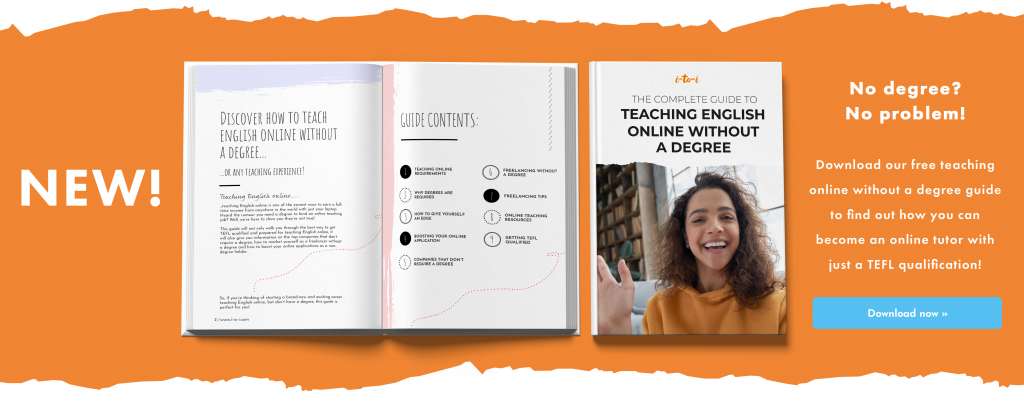Do you love the idea of TEFL but just can’t decide whether to teach English online or abroad? Fear not, we’ve got your back! Tabitha has been a TEFL teacher in both China and France and now teaches English online. She went live on i-to-i’s Facebook page to talk about teaching English online versus TEFL abroad and answer your burning questions. Watch the full webinar or read on for edited extracts.
INTRODUCING TABITHA…
My first teaching job was in China. It was absolutely brilliant but, unfortunately, I had to come back to the UK because of coronavirus. That meant a shift to teaching English online. It was a big adjustment but it ended up being a fantastic experience.
Now, after having taught in person in France over the last year, I’m back to teaching online because I love it. I’ve got the best of both worlds.
TEFL JOBS ABROAD AND ONLINE
What types of TEFL jobs are available abroad?
If you’re teaching English abroad, you might work in a kindergarten, a public school, a private language school or an adult education centre.
When I taught English in China I worked in a private language school. My main student group was Chinese children from the age of four up to 14 but I know people who taught adults and I also know people who taught babies and toddlers. You won’t always be teaching people of the same nationality either. You might teach foreigners who are living in that country, for example. You get a real range, a real variety.
Nine times out of ten, when you’re teaching abroad, you’ll be teaching a group – and it can be quite a large group if you’re teaching in a public school. For example, in China, classes can go up to 50 or 100 students.
What types of online teaching jobs are available?
You get a huge variety of teaching jobs online as there are lots of different online platforms. You might teach young learners or you could do exam preparation for IELTS or business English for adults. There are lots and lots and lots of one-to-one classes – although of course it is possible to do fantastic group classes online too.
I teach with a platform called Preply and also a platform called italki. These are both mixed-age platforms (so you have young learners and adult learners) and both have students from around the world. I have a lot of students from Russia, South America, France and Germany.
Other platforms such as Magic Ears and Cambly are more geared towards young learners and have a very heavy base in Asia. You have a lot of Chinese, Korean, Japanese and Vietnamese learners, as well as people from Thailand where it is becoming more popular.
What hours will I work in a TEFL job abroad?
When you teach English abroad, you’re usually based in a school and have fixed working hours. When I taught in China, my working hours were from 2.30pm to 8.30pm. From 2.30pm to 4.30pm I had planning time and then the students started to trickle in after their public school was finished and I taught until about 8.30pm.
A huge thing that I would recommend is to try to find a job where office and planning time is included in your hours. In the beginning, especially, you will spend a fair bit of time on planning and making sure that your materials are fantastic. If you have a 25-hour week it will make a huge difference if 10 of those are teaching hours and the rest are for planning, rather than 25 hours of actual teaching.
Holidays vary, depending on where you teach. If you have a contract with set hours, you’ll probably get the vacation period of that country. If you’re teaching in China, for example, you might get National Week and Dragon Boat Festival off but not have a lot of other holiday to take during the year. Like any teaching job, you’ve got to be there during term time.
What hours will I work teaching English online?
When you teach online, you’re your own boss. For some platforms, you’ll need to teach set hours. With others, like italki and Preply you set your own availability, which is a huge advantage of teaching online. The only thing is to be aware that there are peak times. If you want to attract students, you’ll probably have to work weekends and evenings because they are very popular.
I have around five students a day and I teach five to six days a week. You might have students who want two hours a day, five days a week or you might have lots of regular weekly students and teach different people during the week. The vast majority of my lessons are one hour long but on italki my lessons go from 30 minutes to 90 minutes. With children, I prefer half-hour online classes because I think it’s easier to retain their attention.
When you’re setting your availability, make sure you schedule in breaks or you might find you have to teach back-to-back for five hours, with no way to get water or pop to the toilet. I schedule in a 15-minute break every two hours.

Is it harder to motivate online students?
It all comes down to the students. If they want to be there, they are going to be very engaged and motivated. If they have some reservations, then you have to work a bit harder as a teacher. That can happen whether it is online or in a real classroom – they are still people at the end of the day.
I absolutely love teaching in-person, running around the classroom, being really active, being able to use that physical space. It has been a really interesting challenge to still make lessons exciting and engaging online. Getting them moving is the absolute key. Make your classes lively, have lots of TPR (total physical response) and also do things like virtual rewards at the end of a lesson.
It is exactly the same basic stuff teaching in-person and teaching online. You need to have really rigorous behaviour management and consequences if they are not listening but lots of rewards and encouragement. I would say that getting them moving is my top tip.
If you’re not yet qualified, i-to-i’s Level 5 Diploma deals with teaching online and teaching young learners, so that’s a fantastic starting place.
Do you have any tips for coping with my first TEFL lesson?
Students appreciate honesty. Particularly with adult students, there is nothing wrong with saying that you are really excited because this is your first online teaching job. Reassure them that you have had all the training but would love their feedback. That sense of collaboration is really nice.
I don’t think you need to fear the fact that this is your first online teaching job. Everybody starts everywhere and students know that.
Do I need an American accent to TEFL?
Absolutely not! I have seen English teachers from all over the world – some with a South African accent, an Australian accent, a British accent, an American accent. If you’re from an English speaking country, including South Africa, there will be a school you can teach at.
For teaching online, I find many students choose me because I have a British accent. There will always be someone who wants what you can offer.
What are the benefits of teaching abroad?
I think a huge benefit of teaching English abroad is being able to immerse yourself in a foreign culture. One of the reasons that I wanted to TEFL was travel. The two go hand in hand.
Another benefit is that many companies offer accommodation as part of their teaching contract, which is great if you’re looking to set up in a new city and you don’t want to worry about the hassle of finding a new apartment.
You also usually have health insurance and get sick pay and paid holidays for teaching abroad, which is not the case for teaching online. If you’re an online TEFL teacher you need to make sure you’ve got your sick pay pot and vacation pay pot to protect you, as you won’t get paid if you cancel a class because you’re ill.
When you’re teaching abroad, you could have a lot of fantastic training from your company, although this does depend on your company. You also can get promoted – which you can’t really with online teaching, although you can raise your rates.
What are the benefits of teaching online?
Flexibility is a huge benefit of teaching online – and that you can work while you travel or work from home. I hated my commute into London, so that’s a huge win for me.
You’ve also got the independence to choose your own materials. Most of my students want to practise their oral conversation and say we can talk about what I want to talk about. You can really follow your passions and let them shine through in your teaching materials, which you might not be able to do if you’re following a set curriculum in a school.
I love that I teach a huge variety of people. I can go from teaching a very elderly man in Japan who wants to talk about his experiences in World War 2 to teaching a little girl in South Korea who’s obsessed with dragons to somebody from South America who’s got a really similar sense of humour and we can laugh about TV shows. You get this amazing human element to teaching online.
TEFL SALARIES ONLINE AND ABROAD
How much can I earn teaching English abroad?
TEFL salaries abroad are very variable. It depends where you teach, who you teach, the company you work for and your hours.
One of the reasons that I chose China was that it had very competitive salaries for teachers who had just qualified. Many Asian countries including China and South Korea have good salaries. Generally, European in-person teaching is a bit lower paid.
How much can I earn teaching English online?
When you teach English online, the more hours you put in, the more you can earn. If you’re willing to work for five hours a day for five days a week, you could earn a pretty good salary, depending on where you live and the rates that you charge.
Online teaching salaries depend on the platform you’re teaching on and whether you can set your own price. If you can set your own price, I would look through other teachers’ profiles and mark your prices lower than the teacher you are most similar to when you start out. There is a lot of competition on these platforms. If you start with a lower price, you will attract more students. Gradually you can raise that price as you build your reputation.
Your planning time is usually unpaid when you’re teaching online. If you’ve got an hourly rate of $14 and you’re planning for an hour and teaching for an hour, really you’re only making $7 an hour. Be aware of that. Don’t fall into the trap of setting really low prices because you might end up making peanuts.
Can I earn bonuses on top of my hourly rate for online teaching?
Bonus payments depend on the platform. Many platforms have a referral reward, so if you’re teaching on the platform and get somebody else to teach on the platform, you can earn a bonus. With some platforms, you can earn an additional bonus if you work overtime or if you work their peak hours, for example.
Online TEFL platforms are usually quite clear on their websites about the benefits they offer, so take a good look at their T&Cs.
Will I earn less teaching English online than teaching abroad?
Generally, the hourly rate is lower for teaching online but how much you earn really depends on how much time you put into it.
I would argue that more people are willing to have an online lesson than an in-person lesson, so you’ll probably have more students online than if you were doing the same kind of independent teaching in person. You’re weighing up the benefits, really.
FINDING A TEFL JOB ONLINE OR ABROAD
What qualifications do I need to teach English?
A TEFL qualification is really important to find a job teaching English. This is the first thing that employers look for. i-to-i has a Level 5 diploma which is fantastic. It has specialist training in young learners and teaching online, which is so important to really make you stand out in the TEFL crowd. Internships are also a great way of getting your TEFL while you work abroad but don’t fall into the trap of thinking you can simply go into a country on a tourist visa, get your TEFL while you’re out there and start earning money. You’ll get into hot water.
Some countries require a degree. For example, China recently changed their legislation and they now require a university degree to teach there but it’s not the case for every country. Your degree does not usually have to be in teaching. Mine was in English literature and I know people who studied a whole range of different subjects.
How can I find a TEFL job?
There is a fantastic jobs team at i-to-i who can help graduates to find work online or abroad. It’s amazing. You’ve got your own personal fan club to help you get your first teaching job – or even your second or third teaching job.
There is also the LoveTEFL Jobs Board which is where I found my first teaching job in China. There are other jobs boards but be aware they are not all as reliable as the Love TEFL jobs board, which has a really good screening process for the adverts they post.
Another way to find TEFL jobs is through Google and I actually found Preply through LinkedIn, which often has TEFL jobs advertised. If you know anybody who teaches online, definitely ask them how they got their job, can they refer you, do they know if their company is hiring right now? They might get a referral bonus, so you’ll be helping them out too.

Do I need teaching experience to get a TEFL job?
If you’re teaching abroad, it’s not necessary to have previous teaching experience. You can get some really good training on your first teaching jobs. When I taught in China, I had two weeks of training in the school before I had to lead my own classes.
If you’re teaching online, it can be an advantage if you’ve got experience but if you’ve got a really good video and a really enthusiastic cover letter and you can explain clearly why you want to teach online, that will shine through, so don’t see lack of experience as a barrier.
Can you give me tips on making my online TEFL interview video?
My video is now on the profiles on both of the platforms I teach with, so make it interesting! Imagine you’re a student on a platform, scrolling through trying to find a teacher. You’ll probably go for the person with the most interesting video, maybe a couple of different camera angles – not someone just sitting there talking.
I’m no tech genius. I took a load of different clips on my phone and then I edited it together with some free software. I talked about my experience, my interests, how I can help students and what materials I use. That was enough to get me the job. The main thing is your enthusiasm.
I was so nervous but you can do as many takes as you like to film that video. You can cut clips together. If you mess up your line, you don’t need to refilm the whole thing. There is some really easy editing software out so you can just redo that bit and edit it together.
What equipment do I need to teach online?
You need a laptop with a high-quality webcam and an internet connection. You also need a good pair of headphones or a headset, so everyone can hear you.
Some people have things like a mouse, keyboard and a stand but as long as you’ve got a quiet place to work, a good internet connection and headphones, you’ll be alright.
Can people over 50 find teaching positions in China and South Korea?
Yes! I taught with somebody who was over 50 in China. They were really passionate about it. They brought a lot of their life experience to TEFL, which I think was a huge advantage.
PROS AND CONS OF TEACHING ONLINE
Pros of teaching English online
- Flexibility: You’re in control. You get to choose your materials and your hours, for the most part. If you decide you want to go on vacation in two weeks, you don’t have a boss to clear it with. If you’re professional and you’ve got a good relationship with your students, you have a lot of flexibility.
- Variety of students: I love that I’ve got students from all around the world who have really different life experiences and who are all learning English for a different reason, at different levels.
- Convenience: It’s not expensive to get set up as an online TEFL teacher. You just need your laptop and headset and you can get going. It makes it really accessible and convenient.
- Easy to manage: If you’re working for a platform, you’re in charge of delivering great lessons but they collect the payments and schedule the lessons. If there’s a problem, there’s a support team to help.
- Lots of opportunities: There are lots of online TEFL jobs and lots of different platforms available. If you don’t have luck with one platform, you can easily go and find a new opportunity with another platform.
Cons of teaching English online
- Pay: Teaching online is not as well paid per hour as teaching abroad, although if you put in more hours, you will get paid more.
- Competition: The online TEFL market can be competitive. However, there are lots of platforms available. If you don’t have success on one platform, you can use another platform or work across multiple platforms.
- Unsocial hours: Your working hours potentially can be unsocial, for example if you find you have lots of Chinese students and they ask you to open availability earlier or later in the day. Ultimately, it’s up to you decide to whether to do that but students do have their own schedules.
- Weekend teaching: Saturdays and Sundays are very busy teaching days. You might prefer to schedule your ‘weekend’ on a Monday and Tuesday and work on a Saturday and Sunday to get the most out of it.
- Screen time: When you’re teaching online, you’ll definitely be spending a lot of time in front of a computer.
Final thoughts…
Whether you’re looking for online teaching work or want to TEFL in person, look at the LoveTEFL Jobs Board. If you’re not yet qualified, take a look at i-to-i’s Level 5 Diploma and the other courses they offer because they are fantastic!
FIND OUT MORE
Listen to the full webinar
Book your TEFL course
Hunt for your dream TEFL job online or abroad at LoveTEFL Jobs
Find Tabitha via Instagram or her blog






















